
Get ready for the 2025 Florida Bar Exam. Learn exam dates, costs, scores, pass rates, results, requirements, subjects, and practice with sample questions.

Florida is 1 of the few remaining jurisdictions that has not adopted the Uniform Bar Examination (UBE®). While the Florida Bar Examination includes 1 component of the UBE — Multistate Bar Examination (MBE®) — the remainder of the exam tests federal and Florida-specific law. As a result, the Florida Bar Exam is considered 1 of the more difficult bar exams nationwide. This article will prepare you with detailed information on dates, format, subjects, costs, results, and more.
The Florida Board of Bar Examiners will begin administering the NextGen bar exam in July 2028, which will include a Florida Law Component.
The Florida Bar Exam consists of essay and multiple choice sections testing general law and Florida law, and the MBE content. The exam is broken into four 3-hour sessions administered over 2 days:
| 3-hour sessions | Day 1 - Part A | Day 2 - Part B |
|---|---|---|
| Morning | 3 Essay Questions | 100 MBE questions |
| Afternoon | 100 Florida-specific multiple-choice questions | 100 MBE questions |
The Florida Board of Bar Examiners has not officially released 2025 exam dates and deadlines. However, Florida typically aligns its bar exam administration with the administration of the UBE. The table below shows estimated dates and deadlines based on historical information. Please visit the Florida Board of Bar Examiners website for updates. Applications must be postmarked on or before the timely filing deadline to avoid a late fee. Applications received after the final filing deadline will not be accepted.
| 2025 Florida Bar Exam Dates and Filing Deadlines | ||
|---|---|---|
| Examination Dates | February 25-26 | July 29-30 |
| Timely Filing Deadline | November 15, 2024 | May 1, 2025 |
| $325 Late Fee Deadline | December 15, 2024 | June 3, 2025 |
| $625 Late Fee Deadline | January 15, 2025 | June 17, 2025 |
To sit for the Florida Bar Exam, you must obtain a JD degree from a law school accredited by the American Bar Association (ABA) or be enrolled in such an institution that will result in the awarding of a JD degree.
To apply for the Florida State Bar Exam, create an account on their website, log in, navigate to "Applicant Portal," and continue through the registration process. You can start and stop the application process as needed, but you must complete it within 6 months of creating your account.

The fee structure for the Florida Bar Exam has many tiers based on when you began law school or started practicing law. Check out the Florida Board of Bar Examiners Application Fee Worksheet for a full breakdown of all applicable fees.
| Application Type | Cost* |
|---|---|
| Registered Law Student | $600 |
| First-Time Application | $1,000 |
| Repeat Taker | $450 |
| Late Filing fee | $325 |
| Final Filing fee | $625 |
| Laptop Fee | $125 |
The Florida Board of Bar Examiners accepts electronic payment via ACH or eChecks, or checks made payable to the Florida Board of Bar Examiners. Credit card payments are not accepted. Applications are not considered complete without payment, and there are no refunds.
For cost-saving options, check Stetson University College of Law’s list of scholarships and outside opportunities. In addition, The Central Florida Association for Women Lawyers (CFAWL) offers an annual Bar Study Scholarship. All full- or part-time law students taking the Florida Bar Exam for the first time are eligible.
The FL Bar Exam tests your legal knowledge, analytical skills, and competence to practice law. It covers a range of subjects, from Constitutional Law and Contracts to Florida-specific law. You will be assessed by your ability to apply legal principles and effectively solve problems to ensure you can competently represent clients and complete entry-level legal tasks.
Part A tests your knowledge of general law and Florida law. The first segment of part A includes questions on Florida Rules of Civil and Criminal Procedure and the Florida Rules of Judicial Administration. The remaining 5 segments will include no more than 3 of the following topics:
Florida has laws that apply throughout the state (general laws) and laws limited to particular areas, persons, or things (special laws). However, certain subjects require statewide uniformity:
Federal Constitutional Law makes up 25 of the 175 scored multiple-choice questions on the MBE and may be tested on the Florida-specific section of the Florida Bar Exam.
When analyzing essay questions about Trusts, ask yourself the following questions: Was a valid trust created? Were other types of trusts created? What are the Trustee’s fiduciary duties? Can a beneficiary access the income of their interest? Can creditors reach the trust? (why or why not?), and What ethical considerations might there be regarding the trust instrument? Additionally, review:
The standard forms of Business Entities are sole proprietorships, partnerships, corporations, and S corporations. Limited Liability Companies (LLCs) are allowed by state statute. Each state has unique laws regulating Business Entities. For example, Florida has no state income tax for LLCs, but you cannot form a series LLC in Florida.
Visualizing the multiple contingencies, remainders, or grantees of conveyances with diagrams will make understanding their relationships easier. The old legalese might be intimidating for some, but familiarity will make analysis easier. Topics within Real Property include titles, mortgages/security devices, real estate contracts, real property, and right in real property.
Read up on Federal Record Code and how it relates to and differs from Florida’s.
Much of the subject matter centers on the theory of negligence. Ensure that you know how to define unlawful actions appropriately before selecting a response. Ask yourself: Would a sensible person behave in this manner? Other topics include intentional torts, strict liability and product liability, and other torts.
States determine who receives your property if you die without a will (intestate). These laws vary from state to state. The same variance is true for the Administration of Estates. For example, Florida has no estate tax, but individuals are still subject to the federal estate tax.
Criminal Law is an arm of Constitutional Law and governs policies by which authorities investigate, prosecute, and adjudicate crimes. Remember that violating the U.S. Constitution is a federal crime and overrules Florida state laws. However, state laws involve traffic violations, contract breaches, robbery, burglary, theft, arson, etc.
Important subjects for review include:
The Uniform Commercial Code (UCC) governs all commercial transactions in the US, but it’s not actually federal law. The Florida State Bar Exam tests Articles 3, which deals with negotiable instruments, and Article 9, which deals with secured transactions.
The Florida Supreme Court has stated that Florida family courts should be able to resolve family disputes in the most effective and efficient way possible. Family court jurisdiction in Florida involves many case types, including child support, dissolution of marriage, and annulment. Review the Florida Supreme Court decisions that have been instrumental in shaping family courts in the state.
The Supreme Court of Florida establishes the rules regulating The Florida Bar. Chapter 4 of the Rules Regulating the Florida Bar covers professional conduct, and Chapter 5 covers the regulation of trust accounts.
According to The Florida Bar Professionalism Handbook, “professionalism is the pursuit and practice of the highest ideals and tenets of the legal profession.” Tenants include character, competence, civility, and commitment.
Testable Subjects on Part BPart B consists of the MBE subjects and topics. The MBE is scored on a 200-point scale and presents candidates with 200 multiple-choice questions. Remember, there are 25 unscored pilot questions for future exams. The remaining 175 questions are divided evenly among the following 7 MBE subjects:
| MBE Subjects | |
|---|---|
| Civil Procedure | Constitutional Law |
| Contracts | Criminal Law and Procedure |
| Evidence | Real Property |
| Torts | |
Quality speaks for itself. Try some of our free MBE sample questions below.
Select a Question sample.Select a Question sample.
A husband and wife were married in State A and lived there for 10 years before separating. One month later, the wife permanently moved to State B and immediately filed for divorce in a federal court in State B. The wife claims that she is entitled to $300,000 in alimony. The husband appeared in the action and has filed a motion to dismiss for lack of subject-matter jurisdiction.
Should the court grant the motion?
Federal courts cannot exercise diversity jurisdiction over cases involving:
A federal court must possess subject-matter jurisdiction to hear the merits of a case before it. Subject-matter jurisdiction can be established through either:
Here, diversity jurisdiction is established since the wife claims that she is entitled to $300,000 and the parties are citizens of different states (States A and B). However, federal courts cannot exercise diversity jurisdiction over cases involving probate matters or domestic relations. Instead, state courts have exclusive jurisdiction over these types of actions (Choice A).* Therefore, the husband's motion to dismiss should be granted.
*The probate and domestic-relations exceptions exist because states have a strong interest in these substantive areas and are more qualified to deal with the constant judicial involvement these types of cases require.
(Choice B) A challenge to subject-matter jurisdiction is never waived. However, a challenge to personal jurisdiction is waived if the defendant has voluntarily appeared in the case, unless it was a special appearance for the express purpose of objecting to personal jurisdiction.
(Choice D) An individual is a citizen of the state where he/she is domiciled—ie, physically present with the intent to remain indefinitely. Since the wife permanently moved to State B, she has established her domicile there.
Educational objective:
Federal courts cannot exercise diversity jurisdiction over cases involving probate matters or domestic relations. Instead, state courts have exclusive jurisdiction over these types of cases.
Bluebook Citations :
A congressional committee investigated the pharmaceutical industry and found that the high cost of prescription drugs purchased and sold in the United States negatively impacted the nation's economy and the health of its citizens. In response, Congress passed a statute that regulates "the retail prices of every purchase or sale of prescription drugs in the United States."
A group of pharmaceutical companies challenged the constitutionality of this statute in federal court.
What is the strongest argument in support of the constitutionality of this statute?
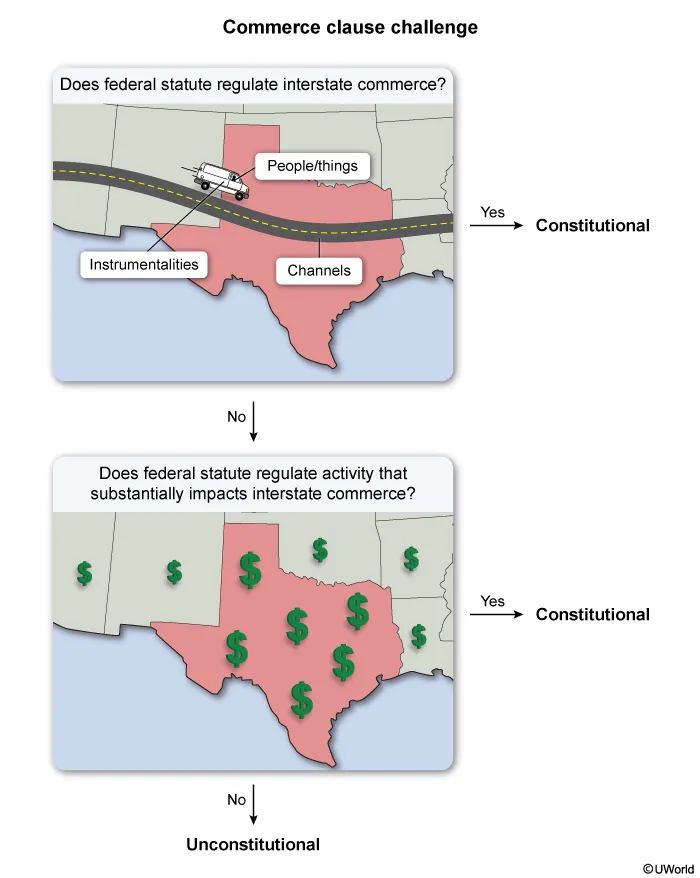
The commerce clause gives Congress broad power to regulate interstate and foreign commerce. This includes:
Since Congress's commerce power is broad, federal statutes are constitutional if there is any rational basis for concluding that the regulated activity substantially affects interstate or foreign commerce. This can be shown through express congressional findings.
Here, the federal statute regulates the retail prices of prescription drugs in the United States. Congress has the authority to regulate such products' interstate transportation, but this statute also regulates in-state purchases and sales (Choice C). Since the congressional committee found that the high cost of prescription drugs negatively impacted the nation's economy, it is rational to conclude that their aggregated in-state purchases and sales substantially impact interstate commerce. Therefore, this is the strongest argument to support this statute.
(Choice A) The taxing and spending clause empowers Congress to tax and spend for the general welfare. But regulating prices is not equivalent to taxing or spending.
(Choice B) Congress cannot regulate the prices of every domestic purchase and sale of goods since it cannot regulate purely in-state sales that do not substantially affect interstate commerce.
Educational objective:
The commerce clause empowers Congress to regulate (1) channels and instrumentalities of, (2) persons and things moving in, and (3) in-state activities that—singly or in the aggregate—substantially affect interstate or foreign commerce.
Bluebook Citations :
The owner of a new office building contracted with a well-known landscaper to design and install landscaping around the building for $30,000. The agreement was memorialized in writing, was signed by both parties, and called for a budget of $5,000 for trees, shrubs, sod, and materials. The contract required the landscaper to complete the work within six months. Due to an unexpected increase in the price of trees and shrubs, the landscaper abandoned the project and never completed any of the work.
Three years after the landscaper's deadline, the building owner sued the landscaper for breach of contract. In the jurisdiction, the statute of limitations for breach of a services contract is two years after the breach, and the statute of limitations for breach of a sale-of-goods contract is four years.
Can the owner recover damages from the landscaper?
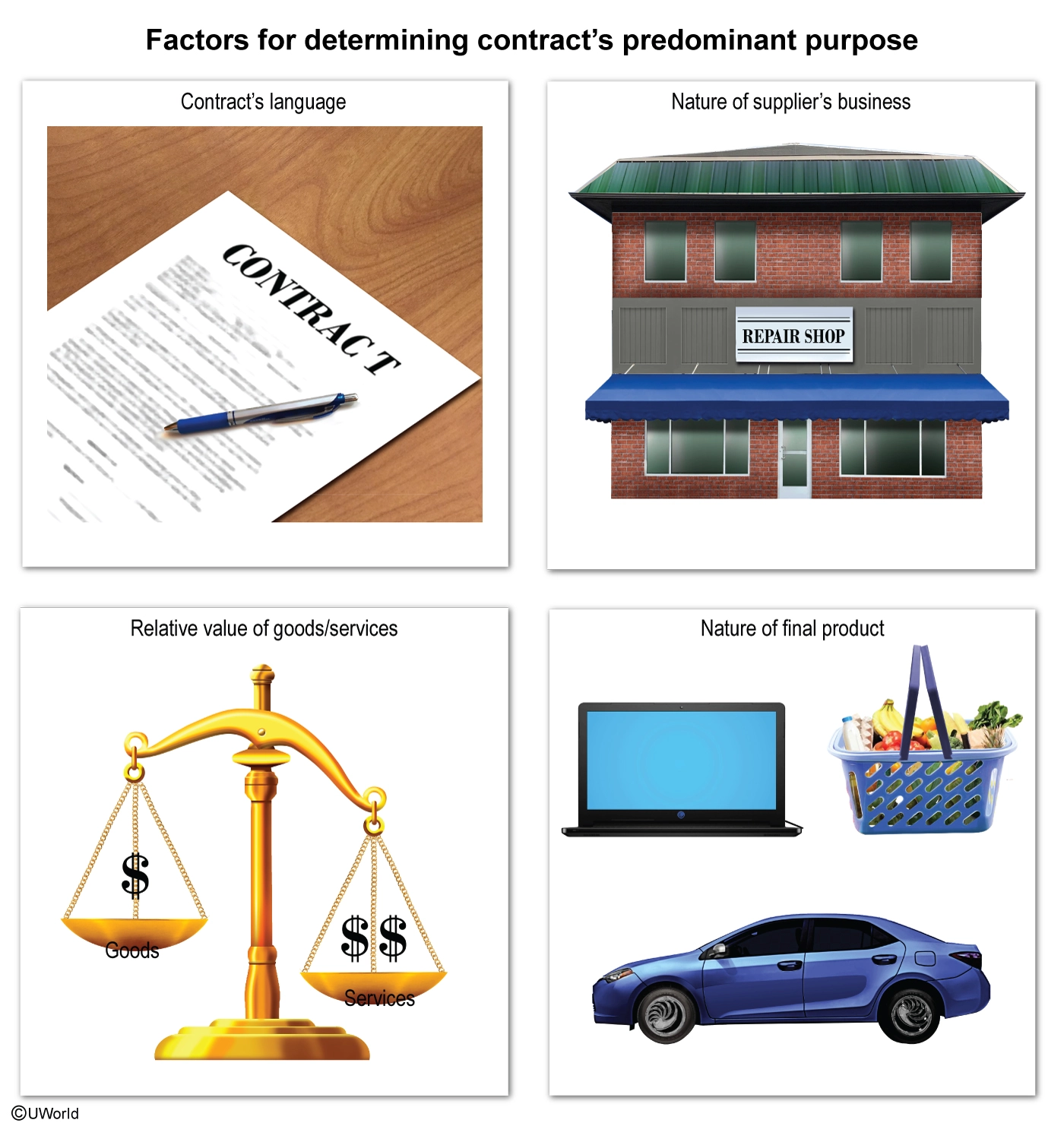
Contracts for the sale of goods are governed by Article 2 of the Uniform Commercial Code (UCC), while contracts for services are governed by common law. However, some contracts involve the sale of goods and the rendering of services. To determine which law applies to a "mixed" or "hybrid" contract, courts ask whether its predominant purpose was the sale of goods or the rendering of services. The following factors are relevant to this determination:
Here, the building owner contracted to buy goods (eg, trees, shrubs, sod) and services (ie, designing and installing the landscaping). The owner likely hired the well-known landscaper due to his skill in performing landscaping services, and the $5,000 budget for goods was just one-sixth of the $30,000 contract price. Therefore, the contract primarily calls for services and is subject to the jurisdiction's two-year statute of limitations. And since the owner sued three years after the breach, the owner cannot recover damages from the landscaper.
(Choice A) The predominant-purpose test is unnecessary when a contract is divisible—ie, when the payment for goods can easily be separated from the payment for services. But here, the contract is likely indivisible since it combined the sale of the trees, shrubs, and sod with their installation.
(Choices C & D) The predominant-purpose test focuses on the parties' reason for entering the contract—not for breaching it. Therefore, it is irrelevant that the landscaper's breach was (1) a result of an increase in the price of goods or (2) willful.
Educational objective:
Sale-of-goods contracts are governed by the UCC, while services contracts are governed by common law. When a contract calls for the sale of goods AND the rendering of services, the contract's primary purpose determines whether the UCC or common law applies.
Bluebook Citations :
A man and a woman dated for several weeks. During that time, the man repeatedly asked the woman to have sex. Each time, the woman responded that she would not have sex with the man unless they were married. One evening, the man promised the woman that they would elope the following weekend if she would agree to have sex. The woman agreed and the couple had sex. The following weekend, the man told the woman that he had no intention of eloping and only made that promise to get the woman's consent. The woman reported the man to the police, who later arrested and charged the man with rape.
Is the man guilty of rape?
In most modern jurisdictions, rape is defined as sexual intercourse with another without that person's consent.* This means that rape did not occur if the victim consented to sexual intercourse. However, a victim's consent may be ineffective if it was obtained by fraud. There are two types of fraud:
As a result, consent obtained by fraud in factum is not a valid defense to rape, but consent obtained by fraud in the inducement is a valid defense.
Here, the man falsely promised the woman that they would elope if she agreed to have sex with him. Since the woman knew that the act to which she consented was sexual intercourse, her consent was obtained by fraud in the inducement (Choices A & C). This type of fraud did not negate the woman's consent, so the man is not guilty of rape (Choice D).
*At common law, rape was defined as (1) unlawful sexual intercourse (2) with a female who is not the defendant's wife (3) against her will by force or threat of force.
Educational objective:
Fraud in factum occurs when the fraud pertains to the nature of the act itself and negates a rape victim's consent. In contrast, fraud in the inducement occurs when fraud is used to gain consent to what the victim knows is an act of sexual intercourse and does not negate the victim's consent.
A plaintiff sued a defendant for negligence to recover damages that the plaintiff suffered as a result of a crash between the two parties. At trial, the plaintiff's attorney called the plaintiff's wife to testify as to what she witnessed on the day of the crash. On cross-examination of the wife, the defendant's lawyer elicited several responses that tended to show that the plaintiff's actions constituted contributory negligence. The plaintiff's attorney seeks to ask the wife several questions on redirect examination, but the defendant's attorney objected.
What is the strongest argument that the court must allow redirect examination of the wife?
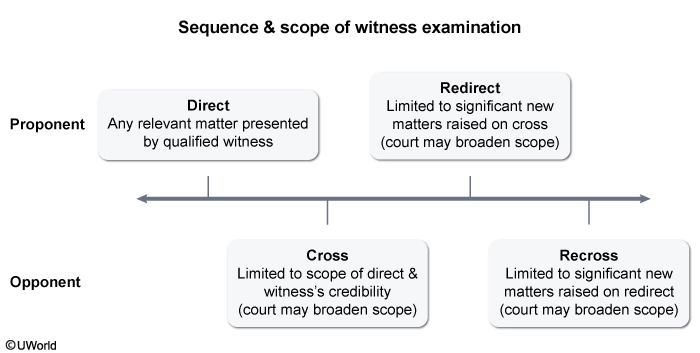
Federal Rule of Evidence 611 gives trial courts the authority to exercise reasonable control over the mode and order of examining witnesses at trial. This includes the discretion to determine whether—and to what extent—redirect examination of witnesses should be permitted. But when a party raises a significant new matter while cross-examining a witness, the court must allow the opposing party to address that matter through redirect examination.
Therefore, the strongest argument for allowing redirect examination of the plaintiff's wife is that the plaintiff's attorney seeks to reply to significant new matters that were raised on cross-examination.
(Choice A) A party is expected to elicit all significant information during direct examination of a witness. Therefore, a court need not permit redirect examination to allow the party to provide information inadvertently omitted on direct examination.
(Choices B & C) Redirect examination is generally limited to significant new matters raised on cross-examination. Therefore, a party is not entitled to redirect examination to (1) reiterate information like the necessary elements of the claim or (2) reply to all matters addressed in cross-examination.
Educational objective:
When a party raises a significant new matter on cross-examination of a witness, the court must allow redirect examination by the opposing party to address that matter.
Bluebook Citations :
Twenty years ago, a man who owned a 20-acre ranch agreed to sell all of his mineral rights to his neighbor. The man executed a warranty deed conveying the mineral estate to the neighbor, who failed to record the deed.
The following year, a woman moved her mobile home onto an undeveloped five-acre portion of the man's ranch. After the woman had lived on the property for 10 years, a local drilling company began operations on a nearby tract to drill a natural gas well. Believing that the woman owned the property, the drilling company approached the woman about leasing the mineral rights on her property and requested that the woman sign a lease of her mineral rights. The woman signed the lease as requested, and it was promptly and properly recorded. The drilling operations were successful, and the drilling company prepared to distribute profits from royalties. However, a dispute arose between the neighbor and the woman, as both parties claim ownership of the minerals.
The period of time to acquire title by adverse possession in the jurisdiction is 10 years.
In an action to determine title, is the court likely to award title to the mineral estate to the woman?
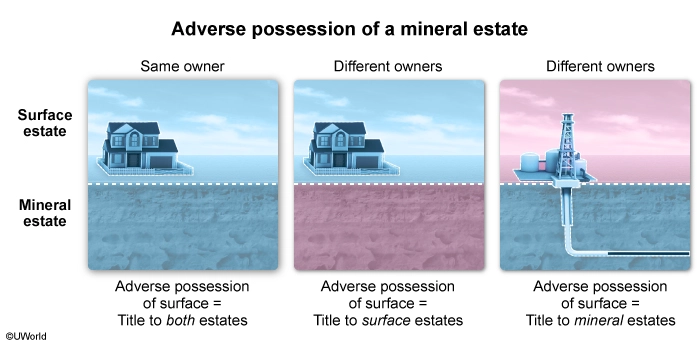
An adverse possessor can acquire title to land owned by another if his/her possession of the land is:
If the surface and mineral estates are owned by the same party, then the adverse possessor will acquire title to both estates—even if only one estate is actually possessed. But if the mineral estate has been severed from the surface estate (ie, the surface and mineral estates are owned by different parties), then the adverse possessor will only acquire title to the estate that is actually possessed. The mineral estate is actually possessed when the adverse possessor mines or drills wells on the land.
Here, the neighbor purchased the mineral estate from the man, thereby severing the mineral estate from the surface estate. And since the woman merely lived on the property for the 10-year statutory period—she did not attempt to mine or drill a well on the mineral estate—she actually possessed only the surface estate during that time (Choice D). This means that the woman did not adversely possess the mineral estate, and the court is not likely to award her title to that estate.
(Choice B) Adverse possession of a mineral estate requires the commencement of drilling or mining operations. Merely signing a lease of the mineral rights is not enough.
(Choice C) A deed need not be recorded to be valid, so the neighbor's failure to record has no impact on whether the woman adversely possessed the mineral estate.
Educational objective:
If a mineral estate has previously been severed from the surface estate (ie, surface and minerals owned by different persons), then an adverse possessor can only acquire title to the mineral estate by actually possessing the minerals (eg, by mining or drilling wells).
A teenager was riding a bicycle when she saw a classmate walking toward her. The teenager rode quickly toward the classmate, knowing that he would think she would run into him on her current trajectory. The teenager was not purposefully trying to harm or touch him. The classmate saw the teenager riding toward him and yelled at her to stop. The teenager swerved at the last moment and avoided hitting him. The classmate had a panic attack because he thought that the teenager would hit him.
Is the classmate likely to succeed if he sues the teenager for assault?
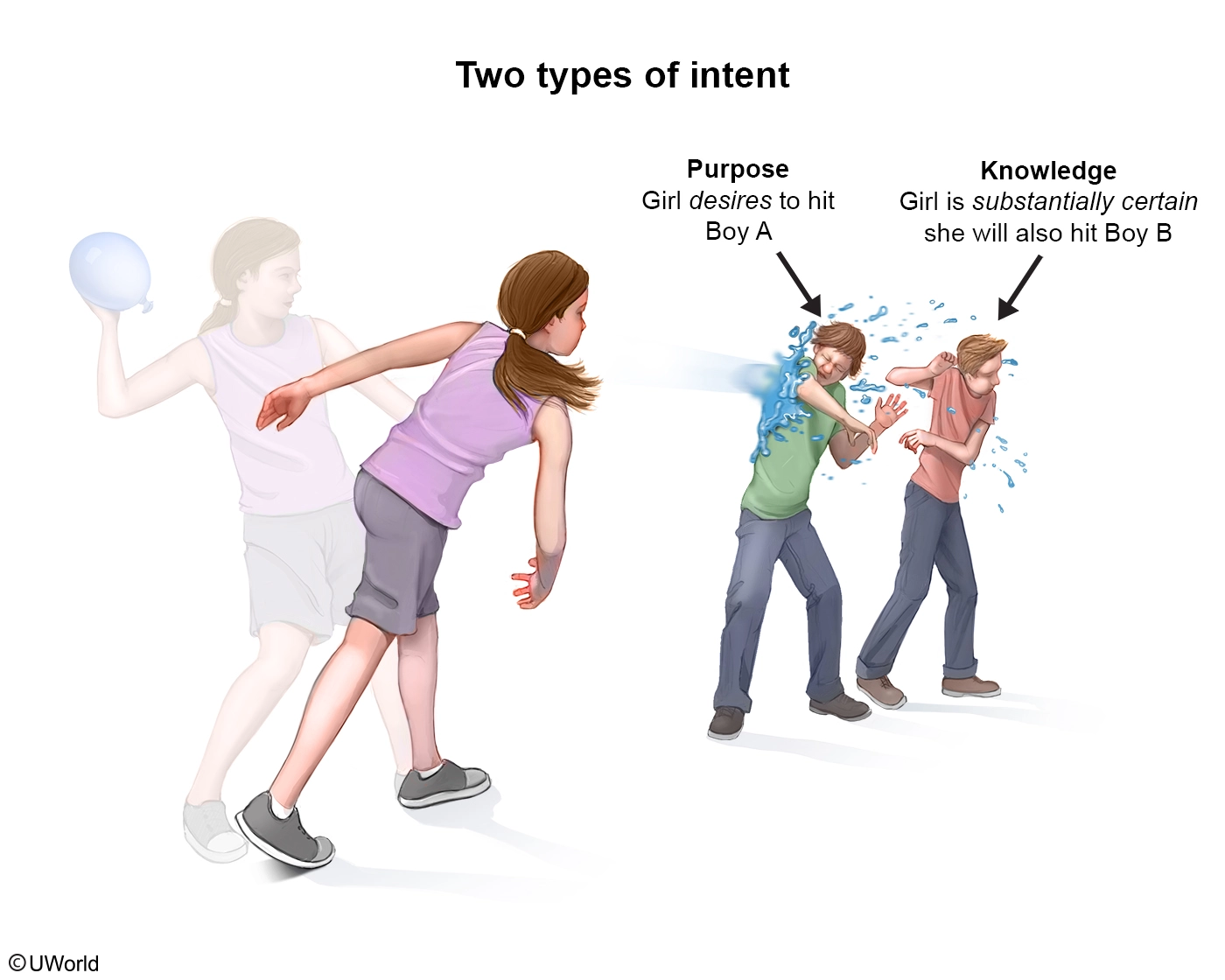
Assault occurs when (1) a defendant intends to cause the plaintiff to anticipate an imminent, and harmful or offensive, contact with the plaintiff's person and (2) the defendant's affirmative conduct causes the plaintiff to anticipate such contact. The intent requirement is met when the defendant acts with either:
Here, the teenager rode her bicycle directly at her classmate, causing him to think that she would hit him (anticipation of imminent contact). And since the teenager knew with substantial certainty that the classmate would think she would run into him, she acted with the requisite intent. As a result, the classmate is likely to succeed in a suit against the teenager for assault.
(Choice A) Assault merely requires that the plaintiff be placed in anticipation of imminent contact. Actual bodily contact is not required. Therefore, the fact that the teenager did not make contact with the classmate is irrelevant.
(Choice B) The intent to make contact with the plaintiff is a requirement for battery, but assault merely requires the intent to cause the plaintiff to anticipate imminent contact. Therefore, the fact that the teenager did not purposefully try to harm or touch the classmate does not absolve her of liability for assault.
(Choice D) Extreme and outrageous conduct (i.e., conduct that is unacceptable in civilized society) is an element of intentional infliction of emotional distress—not assault, which only requires intentional conduct.
Educational objective:
For assault, intent exists when a defendant acts with the purpose (desire) or knowledge (substantial certainty) that his/her conduct will cause the plaintiff to anticipate an imminent, and harmful or offensive, contact.
Take a look at a typical competitor sample question below. Their practice questions might parody the exam, but ours consistently meet or exceed exam-level difficulty. Their limited explanations address the right answer choice but do not go the extra mile to explain the wrong choices – so you don’t make the same mistakes on exam day.
A mother gave her land to her two kids, a son, and a daughter, as joint tenants. The son built two adjoining homes on the land. He lived in one house and rented the other. The daughter lived out of the country and never visited the land. The daughter needed money, so she sold her interest in the land to her ex-boyfriend. Her ex-boyfriend immediately hired a developer to build a third home on the land. Soon after the daughter had sold her interest in the land, she was killed in a motorcycle accident. The ex-boyfriend is now asking the court for a judicial partition of the land. The son contends that upon his sister's death, he was now the sole owner of the land.
How should the court rule?
Correct answer: B

The Multistate Professional Responsibility Examination (MPRE®) is a 2-hour, 60-multiple-choice question exam that assesses an examinee's knowledge of the American Bar Association's (ABA) Model Rules of Professional Conduct. You must pass the MPRE before being admitted to the Florida Bar and can register through the NCBE.
Florida's MPRE minimum passing score is 80 on a scale from 50 to 150. Nationwide, MPRE minimum scores range from 75 to 86, putting Florida in the middle. Eligibility for taking the MPRE is relatively flexible in Florida. For example, you can take the MPRE before you graduate from law school and before or after you pass the bar exam. However, you must pass the MPRE within 25 months of passing the Florida Bar Exam.
Like the bar exam, performance on the MPRE is measured on a scaled score. The National Conference of Bar Examiners (NBCE®) does not publicize the calculations it uses to convert raw scores into scaled scores. However, we estimate that passing the Florida Bar Exam with a scaled score of 80 equates to a raw score of approximately 58%, or about 29 correct answers of the 50 that are graded.
The Florida Bar exam requires an average scaled score of 136 to pass. The final average scaled score is the sum of 50% of the MBE and 50% of the Florida essay/multiple choice exam. Therefore, a high score on one section of the exam can compensate for an unsavory score on the other.
Scaled scores are not to be confused with raw scores. For example, the essay portion of the exam is worth 300 points (100 points per essay), and the 100-question multiple choice section is worth 90 points (10 questions are not graded). So, the highest raw score a person can get on the Florida Bar exam is 390 points.
Florida Bar Exam Results are released in mid-April for the February exam and mid-September for the July exam. The Supreme Court of Florida posts pass/fail results to the Supreme Court of Florida website for 30 days, starting at noon after the morning they are released. For anonymity, results are attached to your applicant file number.
Once the Supreme Court has released the results, you can view them on your online portal page. Applicants without a portal account will receive pass/fail results by mail. You cannot request results over the phone, and the Florida Supreme Court does not release individual score rankings.
Note that in Florida, some examinees take only part A or part B. The data on total applicants below represents examinees who took both.
| Exam | Overall Pass Rate | First-Timer Pass Rate | Repeater Pass Rate | Results Release Date |
|---|---|---|---|---|
| Feb. 2024 | 41% | 56% | 29% | April 15 |
| July 2023 | 61% | 72% | 30% | September 18 |
Here are the annual pass rates for the Florida Bar Exam since 2016, divided into first-time examinees and repeaters: